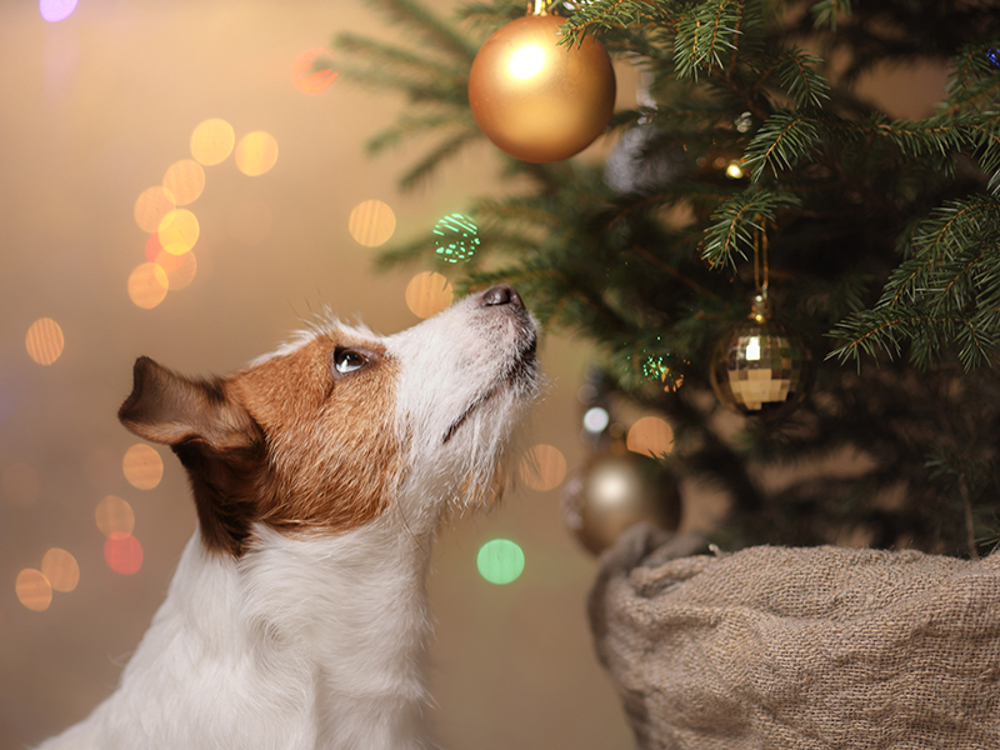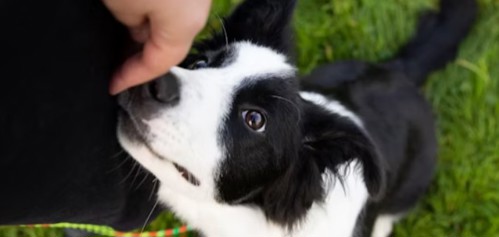
For many, Christmas is a time for sharing mouth-watering and delicious festive foods with friends and family. Although your dog may be high-up there on your list of loved ones, sharing certain human foods with them can make your dog very ill and could even be fatal.
In December, dogs are 75 per cent more likely to be treated by a vet for eating human food that is poisonous to them, compared to any other month of the year, so it's important to know what foods to keep away from your dog.
A summary of Christmas foods not to give dogs
A number of popular foods commonly eaten at Christmas can be harmful to your dog. These include:
- Chocolate
- Christmas cake, mince pies and Christmas pudding
- Sage and onion stuffing
- Other foods, such as certain nuts, blue cheese, fatty and salty foods etc.
At Christmas keep an extra close eye on your dog. Make sure they don’t sneak any of the foods they shouldn’t be eating and remember to keep all dangerous food out of paws reach.
If you're thinking of giving your dog some of your Christmas dinner, then find out some hints and tips on how to do this safely.
Chocolate
Around Christmas time we all have more chocolate in our homes than at any other time of the year. It’s therefore no surprise that the number of chocolate poisoning cases in dogs is highest in December and is one of the most common reasons dogs visit emergency vets around this time.
The best lifetime dog insurance
Protect your dog with the UK's Number 1 pet insurer, with up to £25,000 cover for vet fees.
Hints and tips for keeping your dog safe from chocolate
Over the Christmas period make sure that all chocolate is out of the reach of your dog. This includes:
- Chocolate coins on your Christmas tree
- Advent calendars
- Boxes of chocolate put out on Christmas day
- Wrapped chocolatey presents under your Christmas tree (just because it’s wrapped, doesn't mean your dog can't smell it)
Although chocolate wrappers are not poisonous, they can cause an obstruction if eaten. This can be very dangerous and may require surgical intervention. Signs of an obstruction may include vomiting, lethargy, your dog being off their food, not going for a poo, or finding it difficult to have a poo.
My dog ate chocolate, what should I do?
Call your vet immediately. If your dog is unwell you may need to take them to the vets straight away. If possible try to get someone to call ahead to alert the veterinary practice of the situation so that they can know what to expect and can be prepared.
To help your vet work out how serious it is, try to find any packaging that might give some information on how much has been eaten, what percentage of it was chocolate and what type of chocolate it contained (dark, plain, milk, white etc.).
Do not try to make your dog sick as this can sometimes make them worse.
Find out more about chocolate poisoning.
Christmas cake, mince pies and Christmas pudding
All of these festive treats contain dried grapes in the form of raisins, currants or sultanas. Grapes, and all the dried versions of them, are known to be toxic to dogs. In fact, it’s believed that these dried fruits are more toxic than fresh grapes themselves.
Other Christmassy dried fruit dangers:
- Stollen
- Chocolate covered raisins
- Fruit cake
Find out more about the dangers of grapes, raisins, currants and sultanas.
Call your vet as soon as possible. Any amount of grapes, or the dried versions of them (raisins, sultanas or currants), could potentially be harmful to your dog, so your vet may ask you to bring your dog to the practice. Do not make your dog sick as this can sometimes make your dog worse.
My dog ate raisins/ sultanas a while ago, but is fine – what should I do?
Sometimes the effects from these potentially toxic fruits can be delayed by several days. It’s always best to speak to your vet for advice, even if your dog seems ok.
Sage and onion stuffing
Onions, garlic, leeks, shallots and chives all belong to the allium family and can be found in most types of Christmas stuffing. These plants all contain a substance which can damage a dog’s red blood cells and can cause life-threatening anaemia.
What are the signs of onion poisoning in dogs?
Signs may not show for a few days, but can include being sick, having diarrhoea or abdominal pain and they may appear sleepy, dull, weak, off their food and sometimes they may have rapid breathing. At Christmas, ensure that your dog is kept away from sage and onion stuffing, onion-based gravies or any other allium-based foods.
My dog has eaten onion stuffing, what should I do?
If your dog has eaten any foods containing onions, or other members of the allium family, contact your vet for advice. Signs of poisoning can sometimes be delayed, so even if your dog seems fine it’s still worth seeking advice. Never try to make your dog sick as this can sometimes make things worse.
Other foods to avoid
Macadamia nuts
Why these nuts are poisonous to dogs is not known, but macadamia nuts can cause your dog to appear weak (particularly in their back limbs), dull and sleepy. They can also sometimes appear wobbly on their feet, or they may appear in pain or stiff when walking. Vomiting, tremors, lethargy and an increased body temperature may also be seen. These effects usually appear within 12 hours and may last up to two days.
Some macadamia nuts are covered in chocolate and so pose a double risk to dogsBlue cheese
Roquefort and other blue cheeses contain a substance called roquefortine C, which is produced by the fungus that’s used to produce these cheeses. Dogs appear sensitive to this substance and more extreme cases can cause dogs to quickly develop muscle tremors and seizures, which may last for up to two days.
Alcohol
Dogs are believed to be more sensitive to ethanol than humans and so drinking even a small amount of alcohol can cause effects. Certain alcoholic drinks may be more appealing to dogs, such as cream or egg-based drinks. Dogs may develop similar effects to those expected in humans, including becoming drowsy, wobbly on their feet and in more severe cases they can develop low body temperature, low blood sugar, seizures and coma.
Bones
When cooked, all bones become brittle and can easily splinter. Eating chicken, turkey or goose carcasses may cause larger pieces of bone to cause an obstruction, while smaller pieces may irritate the gut, or even penetrate the stomach or intestinal wall, which may require surgery.
When preparing your Christmas Day meal, ensure that any meat out of reach of your dog. When throwing away a carcass, take it to the outside bin, therefore avoiding any temptation for your dog to raid your kitchen bin during the night.
Fatty foods
Many Christmas foods are very fatty or rich, and a festive overindulgence by your dog may result in a nasty bout of vomiting and diarrhoea. Large high-fat meals can lead to pancreatitis, a very painful and serious condition, which can be costly to treat. Make sure you keep your dog out of the kitchen after you’ve served up your Christmas meal. The remainder of the turkey, any leftovers or even the juices and fats in the meat-roasting pan might be very tempting to them.
Mouldy foods
It's easy to overestimate how much food is needed over the Christmas period and some food may be thrown away. Mouldy foods can contain lots of different toxins and, if eaten, may make your dog ill. One particular substance, which is mostly found on mouldy dairy products, bread and nuts, can cause dogs to quickly develop muscle tremors and seizures, which may last for up to two days. If you compost your food scraps, then make sure that they are kept outside in a sealed container that your dog cannot access.
Thinking of giving your dog a Christmas dinner/ roast dinner?
When you’re sitting down for your Christmas meal it’s nice to be able to share some with your dog, but is this ok and if not is there a way to do it safely?
Quite a lot of food traditionally served up at Christmas is toxic to dogs, too fatty or too salty for them. The last thing you want is for a treat to cause them to feel unwell, or even worse result in a trip to the vets.
Find some hints and tips on how to treat your dog safely at Christmas
- If you’re giving your dog some of your food, even if it’s “safe”, only give them a small amount. Unfamiliar foods can still cause an upset stomach or excessive and uncomfortable wind
- If you give any treats make sure to reduce their meal to help balance their daily calories
- Even if giving dog food, or treats, make sure not to give them too much. Even though it’s Christmas, large amounts of food could be dangerous to them, especially if you exercise your dog within a couple of hours after feeding them
What to do if you think your dog has eaten something it shouldn't have
If you think that your dog may have eaten, touched or inhaled something that it shouldn't have, speak to your vet straight away.
Never try to make your dog sick. Trying to do this can cause other complications, which may harm your dog.
Things to tell your vet
In an emergency you can help your veterinary practice make an informed decision as to whether your dog needs to be treated by them and, if so, what the best treatment would be. Where possible you should provide your veterinary practice with information on:
- What poison you think your dog has been exposed to (e.g. chocolate, ibuprofen etc.). Include any product names, or lists of ingredients if relevant
- How much they may have been exposed to (i.e. 500mg, 500ml, one tablet etc, even approximations may help)
- When your dog was exposed to the poison (i.e. five minutes, five hours or five days ago)
- If your dog has been unwell and, if so, what clinical effects have been seen
It is easier for a vet to care for a poisoned dog if it is treated sooner rather than later. If you are in any doubt, don't wait for your dog to become unwell before calling for advice.
What to take to your vet
If you do need to take your dog to your veterinary practice, make sure that you take along any relevant packaging, or a sample of the poison, e.g. parts of plant or fungi. Always make sure that you yourself are protected and cannot be poisoned in turn.
How to use this information
The information is intended to be used to prevent poisoning by raising awareness of certain poisons, rather than as a document to be used in an emergency. If you think that your dog has been poisoned, or has come into contact with potentially poisonous substances, contact your local veterinary practice immediately.
Think your dog may be affected?
If you're worried about your dog's health, always contact your vet immediately.
We are not a veterinary organisation and so we can't give veterinary advice, but if you're worried about any of the issues raised in this article, please contact your local vet practice for further information.

